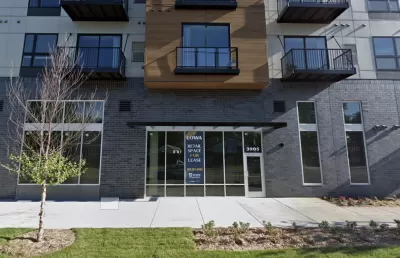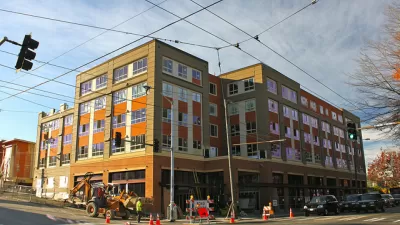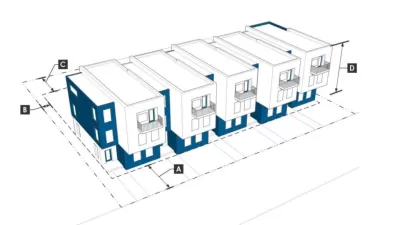Minneapolis developers are agitating against the requirements of mixed-use zoning, saying that it's impossible to find a good tenant for ground floor retail these days.

"Curt Gunsbury wants to replace a vacant parking lot and auto repair shop in northeast Minneapolis with a seven-story apartment building," according to an article by Jim Buchta and Dee DePass, but there's a catch. "City zoning rules say that because the site is in a commercial zone he’s required to devote a portion of the building to storefronts. Gunsbury says prospects to fill that space are dim."
Gunsbury points to empty storefronts on the blocks near the proposed developments as evidence of the difficulties of filling any ground floor retail, and also says that empty retail space is passed on to apartment tenants in the cost of higher rents.
"So Gunsbury plans to ask the city for permission to replace some of that required commercial space with walk-up apartments, which are easier to fill than retail," report Buchta and DePass.
According to the article, Gunsbury is far from alone. "With rising commercial vacancy rates in the Twin Cities, developers are imploring city planners to let them build more apartment units on the street level where commercial space is now required. While planning departments try to make cities more livable with such mixed-use projects, developers argue vacant commercial space increases rents at a time when renters can least afford it. Plus lenders are less willing to finance such projects."
Mixed-use development is desired by planners for its benefits in creating walkable, urban neighborhoods, and according to this article, the concept still has political support. Minneapolis City Council Member Andrew Johnson, for example, is quoted in the article saying developers should reevaluate their commercial rents and place smaller, independent retailers in some of the vacant spaces.
Jeffrey Herman, president of Urban Anthology Commercial Real Estate in Minneapolis, is quoted in the article arguing that COVID-19 is gutting urban commercial markets, in Minneapolis and elsewhere. Not coincidentally, Conor Dougherty and Peter Eavis wrote an article in June 2020 making a similar case, but for the real estate market in New York City.
FULL STORY: 'Nobody wants it.' Twin Cities developers push back on mandated storefronts in apartment buidings

Planetizen Federal Action Tracker
A weekly monitor of how Trump’s orders and actions are impacting planners and planning in America.

Restaurant Patios Were a Pandemic Win — Why Were They so Hard to Keep?
Social distancing requirements and changes in travel patterns prompted cities to pilot new uses for street and sidewalk space. Then it got complicated.

Map: Where Senate Republicans Want to Sell Your Public Lands
For public land advocates, the Senate Republicans’ proposal to sell millions of acres of public land in the West is “the biggest fight of their careers.”

Orange County, Florida Adopts Largest US “Sprawl Repair” Code
The ‘Orange Code’ seeks to rectify decades of sprawl-inducing, car-oriented development.

Maui's Vacation Rental Debate Turns Ugly
Verbal attacks, misinformation campaigns and fistfights plague a high-stakes debate to convert thousands of vacation rentals into long-term housing.

San Francisco Suspends Traffic Calming Amidst Record Deaths
Citing “a challenging fiscal landscape,” the city will cease the program on the heels of 42 traffic deaths, including 24 pedestrians.
Urban Design for Planners 1: Software Tools
This six-course series explores essential urban design concepts using open source software and equips planners with the tools they need to participate fully in the urban design process.
Planning for Universal Design
Learn the tools for implementing Universal Design in planning regulations.
Heyer Gruel & Associates PA
JM Goldson LLC
Custer County Colorado
City of Camden Redevelopment Agency
City of Astoria
Transportation Research & Education Center (TREC) at Portland State University
Camden Redevelopment Agency
City of Claremont
Municipality of Princeton (NJ)





























